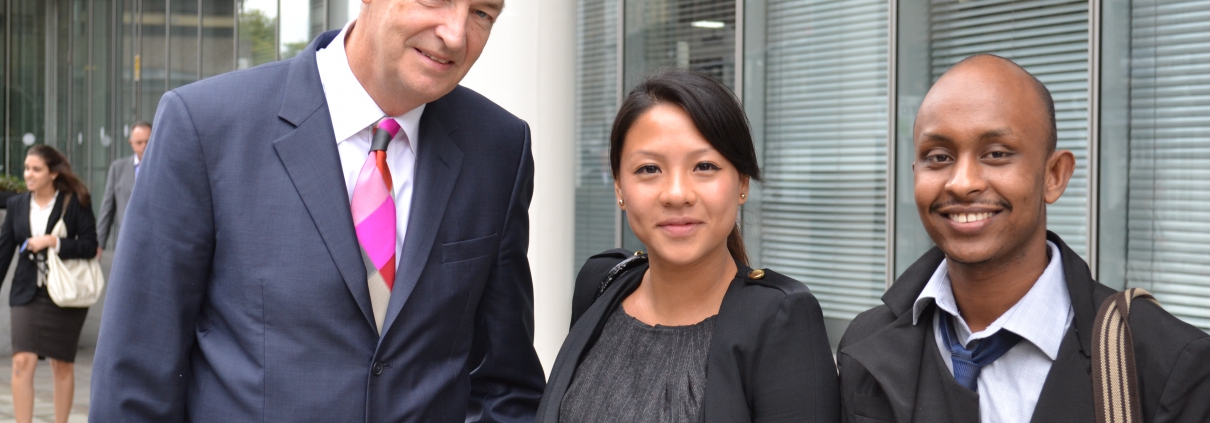Jon Snow on the Truth About Journalism, Youth Representation and Migration
Like 1 million other young people in Britain today I woke up this morning feeling heavy hearted, apprehensive and unacknowledged by the many employers whom I had sent lengthy applications to several months ago. This had become my regular state of mind. Since my job ended in March this year, I had, like so many others, attempted to apply for jobs that I liked, jobs that I was overqualified for, jobs that paid the wage I was on five years ago and jobs that were simply available. I was astonished to learn early into my job hunting mission that many employers do not even recognise receipt of applications these days. Meaning that for suckers like me, I hold my breath for jobs that I really want without evidence that my application has even been seen by the prospective employer! These are certainly difficult times and this morning I wished I could roll back into bed and wake up on the right side. Just as I considered resetting my alarm, I was reminded that this was no regular day of mine. I was preparing for an interview with someone whom I hoped could shed some light on these uneasy times for future generations.
I would meet Jon Snow, an accomplished and widely-respected news reporter of Channel 4 news in five hours time. My excitement of meeting Jon Snow was three-fold. One, he is a well known journalist who has enjoyed a hugely successful career in broadcasting. Two, unlike most reporters he gets away with being openly opinionated. And three, I hear he is a great supporter of young people.
I am always curious to discover how public figures such as Jon Snow connect with every day common folk like me. Generally I feel young people are becoming less important to our society. We have little consumer power; we’re under represented in politics and if that wasn’t bad enough many of us still have to live with our parents! I wondered how Jon Snow would regard someone like me who on the surface is an ethnic minority living in one of London’s poorest boroughs.
I was encouraged at first glimpse by seeing this 7ft tall figure embrace his old friend Vaughan Jones (whom I had got the interview through) with broad open arms when we met. Phew. Jon Snow was clearly in a light hearted mood. I felt I could be confident that he wouldn’t grill me in the way I’d seen him effortlessly do to so many of his guests on TV. And later having spent the next hour or so with him, I realised that he is in fact, as he described himself, like a young person inside. My team mate Farah Mohammoud kicks off our interview with Jon Snow.
FM: Jon, what did you gain from your experience teaching in Uganda with VSO?
JS: I was 18 and I had never been out of England. I wanted to impress my father who regarded me as a very stupid boy, due to my poor A-Levels. I applied and I got it. I was totally radicalised by it – it completely changes your perception of the world in which you live and your relationship with human kind.
FM: Was this the catalyst that propelled your career into journalism?
JS: Absolutely yes – I wanted to be a journalist and I wanted to make a better world – so you could say going to Uganda affected me profoundly. I am probably a politically motivated journalist, I want to change the world, I want to make it a better place – I want to expose corruption, evil and praise good things.
FM: This makes me think of the many young people today who are desperately looking for similar opportunities or life experiences to give them a sense of purpose and direction. Maybe if there were such opportunities for young people to explore their capabilities; more young people would actively work to change the world like you. Sadly with the recession, high tuition fees and major public spending cuts already implemented, the future does not look promising for young people.
Farah delves deeper and questions Jon Snow on the role of the media with regards to youth representation.
FM: What are your thoughts on the portrayal of young people in the media?
JS: Portrayal of young people depends on what media you are talking about. In Tabloids clearly young people have a tough deal. I think the electronic media to some extent ignore young people. I don’t think they consult them, take for example debates about education and schooling. On the other hand there are various constraints to talking to young people. For us you have to have the permission of the parents up to the age of 16. So it’s very difficult to speak to young people of 14-16. By the time we have the parents’ permission, the day is gone.
This is one of the challenges posed by recent technological developments especially within online social media. Not only are journalists expected to respond to broadcasts quickly but the increased demand on their sources and representatives to be instinctively reactive can result in compromised quality reporting.
JS: The image of young people isn’t good and it’s not a conspiracy to portray young people in any light. Many of the journalists divorce themselves from their children and they don’t look through the children’s perspective.
In our 24 month investigative quest to understand how young people have became so unmercifully demonised by the UK press, this statement from Jon Snow was as close to the truth that we had ever been. The journalists’ separation from their own kin must allow them to see other children, as these ‘Hoodies, ASBOs and Chavs not even as th’eir own human kind, labels such as ‘Feral Children’ would suggest that. And some wonder why young people would riot after being discriminated for their age. Are young people the victims of Ageism?
Farah moves on to discussing the experience of young Somalis in particularly. This is especially important to the two of us, Farah being a young Somali who is living in multicultural London.
FM: What are your thoughts on the portrayal of young Somalis?
JS: I don’t think people differentiate between young Somalis and old Somalis. The general portray of Somalis is poor – they are the latest in a sense the largest wave of immigration that Britain has experienced and there’s a very little attempt to understand where they are coming from, what their particular problems are and what gave rise to this exodus. You ask me how young Somalis are portrayed; I don’t mean to detach young Somalis from Somalis in general or from Somali crisis. But generally speaking in a recession people are always looking for people to blame and Somalis are handy people to blame.
FM: What can be done about the misconceptions about Somalis or young people in general?
JS: I am very glad to have been approached by a number of Somali community leaders who have tried to lead me to understand what’s going on and I’ve benefited from this. So I am very aware of the outreach coming from the Somali community itself. The best thing I would suggest that you do is to begin to educate young people about why Somalis are here and what gave raise to their parent’s flight & to your parent’s flight.
Living in Newham, one of Europe’s most multicultural areas, we are painfully aware of exactly how uneducated the general public are on migrations to the UK. At worst a consequence of this misunderstanding leads to violence, racism and xenophobia and at best it can result in ineffective public services.
I woke up this morning unsure of what the day may bring. I go to bed tonight satisfied by our experience of meeting Jon Snow. He demonstrated to us that despite his years of experience and his privileged background that he was just as open to listening and learning from us as he was to talking and sharing the truths that he had discovered along his journey. Furthermore I am contented that Jon Snow reaffirmed the need to educate the British public on the experiences of young people in general and also from migrant communities.
I might not be working in the exact industry and role that I desire but the events of today makes me feel that our voluntary work with Praxis and our commitment to developing You Press is more than worth waking up for.
Interview by Farah Mohammoud and Lè N Ho (Praxis & You Press)





